Found in 1 comment on Hacker News
Jach · 2011-11-15
· Original
thread
I don't think anyone here is arguing that smoking pot (or in general "doing drugs") raises IQ scores... Nor do I see arguing that high IQ scores cause pot use, just that the presence of a high IQ seems to, if the study is to be believed, increase the probability of pot use. Correlations and probabilities are interesting for themselves, and can in fact be used to imply causation. http://www.amazon.com/Causality-Reasoning-Inference-Judea-Pe...

